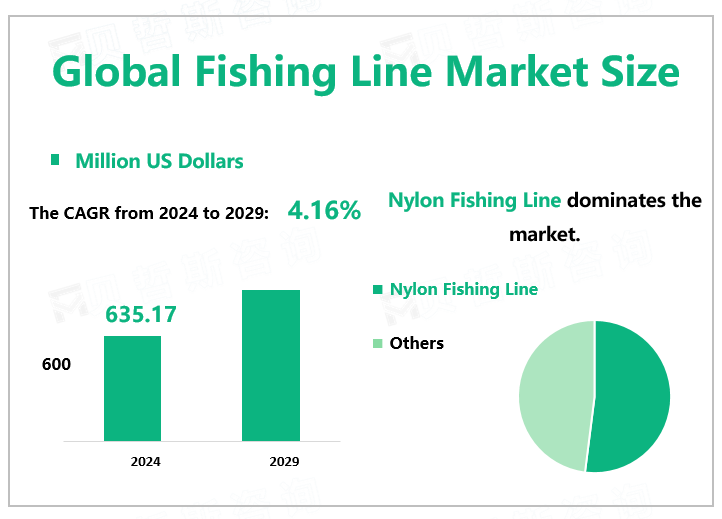Global
Fishing Line Market Overview
According to Global Market Monitor, the global fishing
line market size will be $635.17 million in 2024 with a CAGR of 2.37% from 2024
to 2029. A fishing line is a line or filament that is much stronger and more
durable than any ordinary line fishing line. Some factors can be used as
parameters for the proper selection of a fishing line, such as strength, UV
resistance linearity, knotting strength, extensibility, visibility, wear
resistance, etc.
Product
Types
Among the different product types, the
nylon fishing line segment contributes the largest market share.The nylon fishing line is made of raw materials that
are colorless, transparent, wear-resistant, soft, and elastic. However, this
fishing line is harder under low water temperature conditions and will age when
it is long.
The growing demand for seafood around the
world is driving the market growth and increasing awareness of the nutritional
aspects of consuming seafood such as fish, oysters, squid, and shrimp is likely
to be a driving factor. In addition, due to the durability, strength, and other
characteristics of monofilament fishing lines, the increasing demand for monofilament-type
fishing lines will drive the market.

Market
Drivers
With the continuous development of
production technology, many suppliers have begun to increase investment in
product quality research, and are more focused on improving the wear and
corrosion resistance of fishing lines. Research on the production of raw
materials is also constantly innovating. For example, a small number of
suppliers have begun to study copolymers and synthetic fibers to make fishing
lines. This type of material can help the fishing line to be easier to hide,
and the higher-end users are more favored for this new technology. The
load-bearing capacity is also one of the challenges that the fishing line will face.
Suppliers are also studying the ability to withstand greater weights, such as
fluorocarbon, as a raw material, while maintaining their durability.
As an important part of agriculture and
also a leisure activity, fishing has always been highly regarded in regions
with high per capita income, such as North America and Europe. As the promotion
of the event deepens, the market for Fishing Line is also growing. Due to the
low technical content of the fishing line manufacturing process, most
developing countries have a certain share of this market. With the increase in
per capita income, some regions in developing countries, such as South America
and Southeast Asia, have increased demand for fishing lines. These emerging
regions and the growing areas of the region, rising demand, and expanded
production have all become major factors driving growth in the industry. The
development of the economy and the increase in per capita disposable income
have all contributed to the development of the fishing industry. The demand for
fishing lines is not only from traditional fisheries but also from leisure and
entertainment. The quality of traditional fishery requirements for fishing
lines is higher than that of recreational fisheries. With the promotion of
fishing as an entertainment activity, this part of the fishing line demand is
also promoting market development.
Although the fishing industry is a
relatively important first industry in society, with the emergence of
overfishing, and the occurrence of undesirable fishing during the fishing
season, the development of fisheries has received many restrictions, not only
from regional governments but also from society. Fishing activities are limited
and will affect the demand for fishing lines.
|
Drivers
|
Emerging and Growing Market
|
|
Expanding Downstream Application
|
|
Fishing Line's new technology and
improvements
|
|
Limitations
|
The Development of The Fishing Industry
is Limited
|
|
The industry concentration rate is low
and product quality is different
|
|
Policy Restrictions on Fishing Activities
Become Stricter
|
